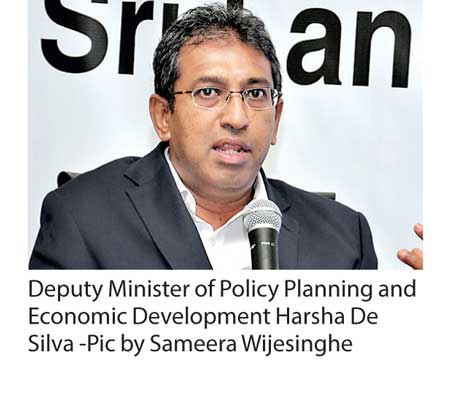Sunday Feb 22, 2026
Sunday Feb 22, 2026
Friday, 3 November 2017 00:00 - - {{hitsCtrl.values.hits}}

By Hiruni Dabarera
The Government yesterday promised to engage in a more proactive reform process to mitigate risks related to the four key areas of fiscal consolidation, trade, disaster management and accountability in order to speed up economic progress.
Deputy Minister of Policy Planning and Economic Development Harsha De Silva promised this while attending the launch of the Sri Lanka Development Update focusing on ‘Managing Risks and creating opportunities for Sustained Growth’ organised by the World Bank.
World Bank Senior Country Economist Ralph Van Doorn, noting how Sri Lanka’s economic performance on a large scale was satisfactory, commended the Government’s efforts to reform existing procedures like the renewal of the Inland Revenue Act and the VAT reforms. However, he stressed that many more reforms were needed, especially in terms of fiscal policy, trade policy, natural disaster management, transparency and accountability if the country was to achieve its ‘Vision 2025’.
In response, the Deputy Minister noted that the Government was planning to bring more reforms pertaining to these key areas. In relation to fiscal consolidation policy, the Minister stated how they were rationalising expenditure. “We are moving money from bricks to microscope,” he said.
In relation to policies reforming trade, De Silva expressed how it entailed both imports and exports and how the Government’s efforts in imposing para-tariffs and reduced duty rates were to develop this sector. Moreover, he noted how protection rates within the country had doubled since 2004 when the SLFP Government was in power.
“A draft policy is in progress, it needs a few minor adjustments and will be released,” assured De Silva. He went on to further highlight how the Government’s main focus was on increasing the share of global trade that the country was responsible for.
Within the past few years local exports dropped from 33% to 13% of GDP and this was not a positive indicator of economic progress. The Government plans to tackle this through the new trade policy.
Further, the Minister revealed how the Liability Mitigation Act would solve some of the problems in relation to debt and liability management. Guarantees made by the Treasury on contingent liabilities had moved from enterprises that make profit like the CPC to enterprises that could not make a profit like the RDA.
He added that after the considerable increase in 2012, the rates remained at the same level and in this sense the Government was irresponsible in giving more guarantees to non-profit organisations. “The Government is aware of this issue and is conscious of taking adequate steps to deal with it,” he said. The encouragement of FDIs was also crucial for this.
Moving on to natural disasters, the Minister revealed the different steps taken by the Government such as signing the Paris Agreement, building sustainable energy plants and enacting policies to utilise wind and solar power for energy generation. Entities like the National Insurance Trust Fund had taken an effort to insure every home within flood-affected areas and more than Rs. 5 billion had been spent on providing disaster relief to these affected houses.
A recent poll conducted by the World Bank highlighted how one of the biggest concerns the country faced was a lack of transparency and accountability. In response to this the Minister said: “It is tough to manage the different forces that come with democracy and to come to a compromise.” Nevertheless, he did agree that in terms of communication the Government needed to make a far greater improvement.
The Minister also stressed the need for land reform, saying that a cadastral registry was yet to be brought into force.